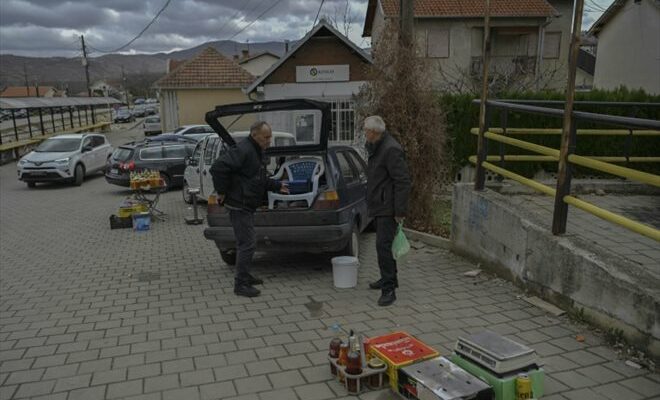A street vendor shows Serbian dinar notes in Gracanica, March 1, 2024 in Kosovo (AFP/Armend NIMANI)
“The salary is late, but not the bills. I don’t know what I’m going to do.” More than a month after the ban on transactions in dinars, Kosovo Serbs are destitute. And neither Pristina nor Belgrade seem to want to move.
Since February 1, commercial transactions in dinars, until then tolerated in areas where the population is predominantly Serb, have been prohibited in Kosovo. Only the euro, the official currency, is authorized.
However, a large part of the Serbian population receives a salary or aid from the Serbian state, in dinars – and often in cash. Thousands of retirees also benefit from this system.
Belgrade, which devotes around 120 million euros of its budget to Kosovo, finances a system of so-called “parallel” institutions: run by and for the Serbian minority, they provide part of the public services. And ensures the loyalty of the Kosovo Serbs.
But since February 1, trucks full of notes coming from Serbia to finance institutions have been pushed back at the border, banks have imposed restrictions on the withdrawal of dinars, and the flow has dried up.
In the north of Kosovo, a few dozen kilometers from Serbia, it is still possible to organize yourself to withdraw money. But south of the Ibar River, the lack of cash becomes alarming. According to the Serbian public television channel RTS, there has not been a single dinar left south of Mitrovica since Thursday.
In Gracanica – where there is an Orthodox Church famous throughout the region, the ban on the dinar is on everyone’s lips.
“The salary is late, but not the bills. I don’t know what I’m going to do,” explains Snezana Vujovic, a 43-year-old nurse.

A bank branch in Gracanica, March 1, 2024 in Kosovo (AFP/Armend NIMANI)
For weeks, people have been queuing in front of the Serbian Postal Bank – the only place where Kosovo Serbs can withdraw the money paid to them by Belgrade.
“The economic situation is already difficult enough, and without money from Serbia, it’s even harder,” sighs Momir Jeftic, 68, met by AFP next to a desperately empty ATM.
“Now, if we want money, we have to go to Serbia,” adds this retiree, who is thinking of drawing from the food reserves he has amassed in anticipation of dark days.
Since February 1, many Kosovo Serbs have made the trip to Serbia – at 10 euros per passenger, some have even used it as a way to supplement their income.
– End of a system –
“All of this is just done to harm citizens,” says Dragan Colic, 68 years old. “Because the more money comes in, the richer Kosovo is.”

Street sellers prepare their goods in Gracanica, March 1, 2024 in Kosovo (AFP/Armend NIMANI)
Pristina explained that it was not a question of prohibiting Serbia from paying salaries to Kosovo Serbs, but that Belgrade had to do so in euros. For the Prime Minister, Albin Kurti, it is a question of combating “illicit financing, money laundering… things that took place in the past”.
Kosovo, however, decided, pushed by some of its Western allies, to extend the transition period before completely banning transactions in dinars. Originally one month, it increased to three.
Serbia has continued to denounce a “crime against humanity”.
For Branimir Stojanovic, a Kosovo Serb activist based in Gracanica, the ban on the dinar could signal the end of parallel institutions.
“Serbia’s financial aid literally fuels the only engine that works here,” he explains to AFP. “If you take away the gasoline, you’ve basically just caused the whole system to shut down.”
Ferdi Ahmeti is a grocer in Gracanica. Rom, he is caught in the crossfire. And its revenues fell by half from the first day of the crisis.
“For me it’s the same thing, dinars or euros. In the morning I have to change dinars into euros to buy products, because you can’t pay in dinars at the Pristina market, only in euros. But most of my clients paid me in dinars.
The grocer only hopes for one thing. “That we will soon find a solution.”
© 2024 AFP
Did you like this article ? Share it with your friends using the buttons below.




